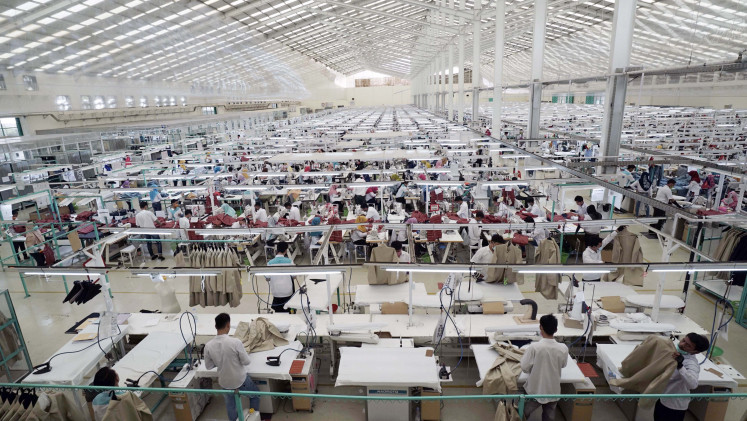Combating illegal software downloads
As pirated software is pervasive on e-marketplaces, the extent of the associated damage to the nation’s economy may be more serious than we might nominally assume.
Change text size
Gift Premium Articles
to Anyone

T
he development of advanced technology has changed the course of trade from a brick-and-mortar approach to online channels, where most products are sold through e-marketplaces.
Despite being a game changer in terms of expanding firms’ sales, the online environment brings new challenges for authority, particularly with regard to controlling products that are being sold. As a result, pirated software, including operating systems, games, movies and productivity software, is seemingly rampant, being offered on various e-marketplaces.
The government has recently established an intellectual property (IP) task force consisting of various government agencies, including the Communications and Information Ministry, the Customs and Excise Directorate General, and the IP Directorate General, to combat online piracy.
The IP task force has liaised with e-marketplace operators and requested that they comply with prevailing copyright laws for the products marketed on their platforms. Offenders may be brought to court and made subject to criminal penalties, including heavy fines and, indeed, imprisonment for the most egregious violations. The government’s move to bolster enforcement against pirated products is timely and appropriate as many countries are now taking similar approaches, including China and Malaysia.
Selling pirated software might be one of the most profitable businesses online, as the associated sellers purportedly spend negligible amounts in terms of investment and can somehow massively inflate the selling price to end customers, allowing them to receive quite substantial profit margins. Buyers, to some extent, also benefit from purchasing illicit software since they can obtain the products at a price that is substantially lower than they would otherwise pay to the legal developer.
As pirated software is pervasive on e-marketplaces, the extent of the associated damage to the nation’s economy may be more serious than we might nominally assume.
First, Indonesia may not be seen as a favored investment destination as the country is on the Priority Watch List according to the United States Trade Representative (USTR). There is evidence to suggest a correlation between pirated software and a country’s economic growth, where the more extensive the piracy of software in a given country the lower the country’s economic growth as the influx of investment appears to be dampened.
Second, from an entrepreneurial perspective, allowing illegal software to circulate freely on e-marketplaces may be detrimental to the country’s innovation, thereby undermining the long-term viability of industries in the country in question. Furthermore, it creates unfair competition for local software developers as they must compete with the pirates, who actually spend nothing on the research and development processes and thus do not incur any of the expenses otherwise associated with developing and marketing the software. Therefore, to some extent, it disincentivizes local software developers from innovating and creating new software.
Third, despite being affordable, illegal software is unsafe to use and prone to various cyberattacks and stability issues, compromising customers’ privacy and security. In addition, customers might not receive the updates from the developers that are necessary to fix bugs, hampering customers’ productivity. The ubiquity of illicit software also makes customers excessively reliant on pirated software for their needs instead of purchasing legitimate copies.
Meanwhile, software development has switched from on-premises software installed on the customers’ devices to subscription-based software or online cloud services that protect software from piracy. Hence, customers who rely on illicit software are less likely to purchase such software in the future.
With illicit software prevalent on e-marketplaces, customers might feel that this software is acceptable from a legal and ethical perspective, such that they do not feel any real guilt for purchasing such software. However, to be fair, in some cases, customers are deceived by sellers who claim such products are “original” or “genuine” in an attempt to entice customers.
The government may prevent customers from continuing to purchase illegal software by educating them about the differences between genuine and what are merely claimed to be genuine products. Additionally, the government may provide information regarding the dangerous effects of pirated products, which essentially range from compromising customers’ security and privacy to the potential punishment they may receive as a result of using pirated software.
This approach may increase customers’ awareness of the use of original software, so that the demand for illegal software will be accordingly reduced. Focusing on the demand side might be more significant in terms of thwarting the spread of illicit software than just targeting the supply side.
The government may also take preventive measures to avoid the revival of any other online channels, including social media, which may arise because of stringent enforcement on e-marketplaces.
***
The writer is a trade analyst at the Ministry of Trade and is currently a PhD candidate at the Swinburne University of Technology Faculty of Business, sponsored by an Australia Awards Scholarship. The views expressed are personal.









